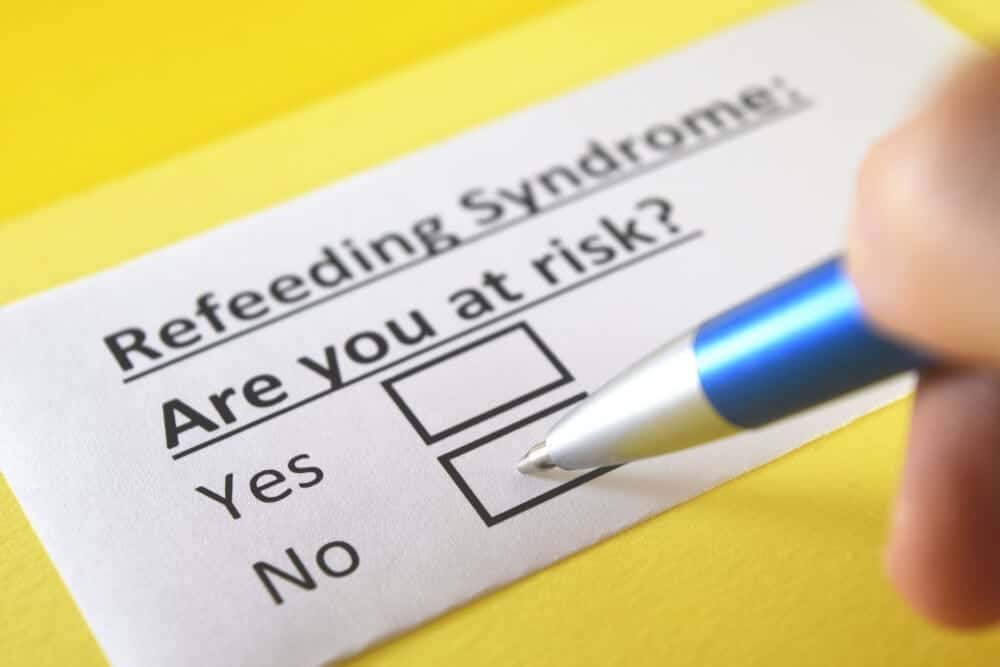
Refeeding syndrome often occurs in patients recovering from anorexia nervosa, but may also occur in subclinical disordered eating, such as intermittent fasting.
If you’re embarking on eating disorder recovery or know someone recovering from an eating disorder, it’s important to understand the signs and symptoms of refeeding syndrome. After all, refeeding syndrome can be a normal part of recovering from anorexia nervosa or other eating disorders, but it can be scary when you are going through it.
If you’re struggling with an eating disorder, learn more about our Los Angeles eating disorder treatment or call us now at 888-272-2062 or verify your insurance.
What is Refeeding Syndrome?
Refeeding syndrome is an imbalance of fluids and electrolytes due to prolonged fasting that is seen when patients are renourished after caloric deprivation. Fasting for extended periods of time may also cause malnutrition, which can lead to additional complications with refeeding. Usually, refeeding syndrome is seen with 7-10 days of fasting.
Fluids and electrolytes are typically imbalanced within the first few days of refeeding. Additionally, cardiac complications may occur within the first week, and delirium and neurological complications can occur generally afterward.
In the modern era, anorexia nervosa is the most common clinical presentation of refeeding syndrome. That’s why it’s important for medical professionals to provide nourishment slowly to underweight patients suffering from anorexia nervosa.
Not all patients suffering from anorexia will experience refeeding syndrome, but hospitalization can help patients recovering from severe anorexia if they do develop refeeding syndrome since doctors can provide nutritional supplementation that helps correct vitamin and mineral deficiencies and electrolyte imbalances.
Historical Cases of Refeeding Syndrome
There have been several notable cases of refeeding syndrome throughout history. For example, refeeding syndrome was first seen in severely malnourished prisoners in Japanese internment camps after World War II.
Famously, magician David Blaine completed a 44-day water-only fast in 2003, after which he developed refeeding syndrome. As he started to eat again, his blood phosphorous levels dropped dramatically, requiring him to be hospitalized for the intravenous administration of phosphate.
Unfortunately, despite these historical cases of refeeding syndrome, many doctors are still not aware of the condition, so they may not know how to prevent or treat refeeding syndrome in patients with eating disorders or patients who fast for extended periods of time.
What Causes Refeeding Syndrome following Fasting?
Refeeding syndrome occurs when patients who fast for prolonged periods of time are refed too quickly or not carefully enough. But why does this occur?
During prolonged fasting, writes the National Institutes of Health, the body begins to break down fat and muscle stores. First, the body switches from using glucose to using ketones as its main energy source. Once ketone stores are depleted, the body begins breaking down fatty acids. As a result, intracellular stores of vitamins and minerals can decrease, though blood serum levels may remain normal; this can make refeeding syndrome difficult to detect in some patients.
When refeeding occurs, insulin production increases. This stimulates the transport of potassium into the body’s cells, which requires minerals like phosphate and magnesium to happen. Water is also pumped into the cells. As a result, blood levels of electrolytes decrease as intracellular levels of these nutrients increase. Because these nutrients are already depleted prior to refeeding, deficiencies can occur — and even become life-threatening to patients who develop refeeding syndrome.
Some causes of refeeding, such as specific nutrient deficiencies, differ from patient to patient. Accordingly, there are things doctors can do to prevent refeeding syndrome when treating patients with anorexia nervosa or other fasting complications.
Body-Fluid Disturbances
According to Johns Hopkins, disturbances in the distribution of body fluid during refeeding can lead to hypotension, fluid overload, cardiac failure and other complications. Refeeding with high numbers of proteins can increase this risk via sodium imbalance, but refeeding with predominately carbohydrates can decrease the risk.
Hyperglycemia
Refeeding too quickly with too much glucose (i.e. sugar) can cause hyperglycemia, which may lead to ketoacidosis, dehydration or coma. Glucose may also be converted to fat, leading to hypertriglyceridemia, a condition that may negatively affect the liver. Monitoring glucose and fat administration during refeeding can help prevent hyperglycemia and hypertriglyceridemia.
Vitamin and Mineral Deficiencies
Patients who are malnourished due to prolonged fasting may present with deficiencies in thiamine, phosphate, magnesium and potassium, which can have extremely negative health consequences if left untreated. These deficiencies can negatively impact the eyes, the kidneys and even the heart.
How to Prevent Refeeding Syndrome
Medical professionals should understand how to prevent refeeding syndrome in patients with anorexia nervosa and other eating disorders. Doctors should refeed patients slowly, starting with 1,000 calories per day and increasing by 20 calories each day, to prevent refeeding syndrome.
Administering oral vitamins and minerals such as phosphate, calcium, magnesium and potassium can also help prevent refeeding syndrome. Patients receiving parenteral nutrition are at especial risk of phosphate deficiency; however, this risk decreases by almost 20% when parenteral nutrition is supplemented with phosphate.
Finally, doctors should monitor their patients’ urine output to keep an eye on whether they might develop refeeding syndrome. Decreased urine output is a critical sign of refeeding syndrome since it indicates an imbalance of fluids in the body.
When is a Patient at Highest Risk for Refeeding Syndrome?
Some patients are at higher risk of refeeding syndrome than others. The National Institute for Health and Clinical Excellence has established clear criteria for when patients should be monitored for refeeding syndrome.
Patients with a BMI less than 16, weight loss of greater than 15% in the last six months, little or no nutritional intake for 10 or more days and/or low levels of minerals before refeeding should take extra caution.
Because alcoholism and chemotherapy also increase the risk of refeeding syndrome, a history of cancer, alcohol or drug abuse may also warrant additional monitoring for refeeding syndrome.
When Hospitalization is Required for Refeeding Syndrome
Currently, there are clear guidelines on when patients with anorexia nervosa must be admitted to the hospital or to a specialized inpatient unit for refeeding syndrome. If a patient weighs less than 70% of their healthy body weight or displays heart irregularities, patients should be hospitalized.
Sometimes, doctors may want to pursue an aggressive refeeding strategy during hospitalization for anorexia nervosa. After all, weight restoration is one of the most important steps in treatment for any eating disorder, as being underweight takes a toll on the health of the body.
According to Eating Disorder Hope, studies of patients receiving 1,100 calories per day and 1,800 calories per day indicate that this is safe, as patients receiving 1,800 calories per day had greater weight gain, shorter hospital stays and, while more likely to require phosphate supplementation, did not develop refeeding syndrome.
Aggressive refeeding is sometimes recommended in the United States healthcare system due to shorter hospital stays as a result of privatized healthcare. Still, doctors should know when not to attempt an aggressive refeeding strategy, even when a patient is hospitalized. Doctors should not attempt aggressive refeeding when patients are showing signs of refeeding syndrome, exhibiting phosphate deficiency or weigh less than 70% of their healthy body weight.
Refeeding Syndrome and Anorexia Nervosa Outcomes
Research shows that refeeding syndrome greatly influences the outcomes of patients with anorexia nervosa. Anorexia nervosa has the highest mortality rate of any mental illness — and 10% of patients in intensive care for anorexia nervosa will die. According to the National Institutes of Health, early detection of refeeding syndrome is critical in reducing the mortality of patients with anorexia nervosa.
Refeeding Methods and Anorexia Outcomes
So, which refeeding method is better to reduce the risk of refeeding syndrome and relapse: nasogastric nutrition or meal-based refeeding? Meal-based refeeding is associated with fewer complications than nasogastric nutrition and results in a lower risk of relapse. Most meal-based specialty programs aim for weight gain of 2-3 pounds per week. However, when adequate weight gain cannot be achieved through meal-based refeeding or the patient does not have access to such a program, nasogastric nutrition is an appropriate substitute.
What to Do if You Suspect Refeeding Syndrome

If you are at high risk of refeeding syndrome or suspect that you are developing it, you should seek medical attention immediately, since it can be fatal and is considered an emergency. You should go to your nearest emergency room, where you may be admitted for fluid and IV mineral administration.
If you suspect you have anorexia nervosa after your weight is restored in eating disorder recovery, our counselors here at The Meadowglade are trained professionals who would love to help you recover from anorexia nervosa.
